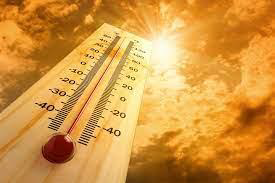What is heat stress?
Heat stress occurs when the body cannot get rid of excess heat. When this happens, the body's core temperature rises, and the heart rate increases. As the body continues to store heat, the person begins to lose concentration and has difficulty focusing on a task, may become irritable or sick, and often loses the desire to drink. The next stage is most often fainting and even death if the person is not cooled down.

What are the signs and symptoms of heat stress?
Symptoms of heat stress:
- Tiredness and lethargy
- Headache
- Dizziness
- Feeling faint
- Muscle cramps
- Feeling thirsty
- Going to the bathroom less often
Signs of heat stress:
- Pale skin
- Excess sweating or no sweating
- Dark urine
How to prevent heat stress
To prevent heat stress, you need to:
- Increase the frequency and length of rest breaks
- Provide cool drinking water near workers and remind them to drink a cup every 1/2 hour
- Caution workers about working in direct sunlight
- Train workers to recognize the signs and symptoms of heat stress
- Tell workers to wear light summer clothing to allow air to move freely and sweat to evaporate
